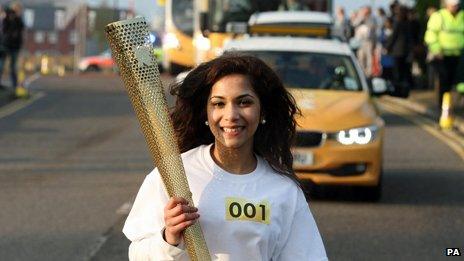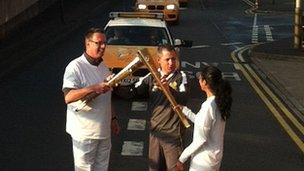London 2012: 'Great' test day for Olympic torch relay
- Published

The first torchbearer Jasmine Vanmali carried the torch from the National Space Centre
A dress rehearsal of the London 2012 Olympic torch relay from Leicester to Peterborough has been hailed as a "great day" by Games organisers Locog.
Chief Executive Paul Deighton said the test "confirmed the convoy works for communities of all sizes" after it traced an 80-mile journey.
Residents turned out to watch along <link> <caption>the route</caption> <url href="http://news.bbc.co.uk/1/shared/bsp/hi/pdfs/19_03_12_day46_leicester_peterborough.pdf" platform="highweb"/> </link> the torch will take on 3 July.
Roads were closed as the convoy, crew and communication procedures of the relay, starting on 19 May, were tested.
Mr Deighton said: "Today has confirmed that the convoy operation works for communities of all sizes, that our communications systems are robust and effective and that we have correct timings for each part of the day.
"It has been a great day."
He thanked the torchbearers, local hosts and "thousands of people who lined the streets over the twelve hours" after the torch ended its journey just after 1930BST.
Earlier, Locog chair Seb Coe told BBC News the run through was "a rigorous test" which would allow Locog to look at the elements it would need to modify.
Locog chose this section for the rehearsal because it took in both rural and urban locations and allowed them to test the technicalities of the torch travelling on trains and boats and going through a city and pedestrian areas.
People were warned to expect some disruption caused by rolling road closures.

Volunteers touching torches to simulate passing the Olympic flame
A total of 122 people from the local area, including students, acted as torchbearers and each carried an unlit torch on a 300m section of the route.
They were joined by a convoy of 14 cars and trucks, and up to 90 other vehicles for sponsors, support teams and the BBC, as well as a crew of 400 people.
The first torchbearer, Jasmine Vanmali, left the National Space Centre in Leicester just after 0712BST and carried the torch along roads, flanked by security personnel, before touching torches with the second bearer to simulate passing the Olympic flame.
The torch travelled by steam train on the Great Central Railway and was carried on two boats, a Warrior and a Rigid Inflatable Boat (RIB), on Rutland Water.
The convoy passed through Quorn, Loughborough, Hoton, Wymeswold, Asfordby and Melton Mowbray.
Charnwood Borough Council, responsible for Loughborough, was the first to say the test in its area had been a success.
"Early indications are that the rehearsal through Charnwood went very well," said Paul Harley, councillor for leisure and culture.
"As with any major event, there will be a full debrief when we will have a better idea of any lessons learned and how we can better prepare for the actual event."
The torch relay team stopped for lunch at Long Field School in Melton Mowbray where it was greeted by a small group of invited pupils.
"It's a lot bigger than I was expecting," pupil Ellie said. "I thought it might just be a few cars but it's actually massive."
Locog's Deborah Hale told the BBC that there had been a few hitches during the morning, but nothing which actually stopped the relay.
"It's gone pretty smoothly so far," she said. "There have been a few little things but nothing which has affected proceedings."
During the afternoon the relay took in Langham, Oakham, Uppingham and Stamford.
It was greeted at the finishing point in Peterborough, Cambridgeshire, by a crowd of about 100 people.
An evening celebration will be held in the city on the real night of the torch relay.
There were some traffic problems on the roads but Locog said communication would be the key to keeping vehicles moving.
"Our approach is to communicate with people," CEO Paul Deighton told the BBC.
"We had signs telling people we were blocking the roads but we were through it and out in 10 minutes or so," he said.
Rolling roadblocks
About 200 road marshals managed traffic, with rolling roadblocks used to close sections for about 10-15 minutes in advance of the arrival of the torch and reopening about 30 minutes later, once the convoy had passed.
Drivers were asked to avoid travelling on the route and residents were asked to remove their vehicles in advance of the convoy. Public transport was also affected.
Participants were nervous ahead of the relay. One acting torchbearer Kayleigh Pettit, 23, a Loughborough University student, said she worried about dropping the torch.
"I was initially quite worried about it because of how heavy the torch was going to be and anyone I mentioned it to said 'Oh what if you dropped it?' but it's actually very light and easy to hold."
People turned out in each area to watch the torch go by. Ellie Parry wrote on Twitter: "Watching the Olympic torch relay test run in Loughborough. How very exciting it all is!" and Jodi Hollingsworth also tweeted: "I've been very bah humbug about the Olympics up to now, but I must admit to a passing interest in the torch relay passing my house".
Security team
The Olympic flame arrives in the UK on 18 May and begins its 70-day journey at Land's End, Cornwall, on 19 May.
<link> <caption>It will pass through 1,018 UK places</caption> <url href="http://www.bbc.co.uk/news/uk-15572381" platform="highweb"/> </link> , as well as visiting Dublin, on its journey to the opening ceremony of the Olympic Games on 27 July.
The torch will be carried by 7,300 people who were nominated and another 700 who are athletes and celebrities.

A torch security team will protect the flame and torchbearers
Each torchbearer will carry the flame for about 300m and on average 110 people will take part each day.
A torch security team, made up of 70 officers, will be responsible for protecting the flame and the torchbearers during the relay.
At any one time up to 52 officers will travel with the torch relay with five teams of up to seven officers running alongside and around the torchbearer.
Their role will involve communicating with the public, torchbearers and spectators while maintaining security. Remaining team members will carry out planning and command and control duties.
Earlier this week Locog urged protesters not to disrupt the torch relay.
Their plea came after a judge issued a court order to prevent <link> <caption>"illegal activity" by protesters opposed to the building of an Olympic training venue</caption> <url href="http://www.bbc.co.uk/news/uk-england-london-17764028" platform="highweb"/> </link> in east London.
Days later the <link> <caption>University Boat Race was halted</caption> <url href="http://www.bbc.co.uk/news/uk-england-17651637" platform="highweb"/> </link> when a protester began swimming next to the boats in the River Thames.
And during their final visit to London last month, International Olympic Committee members were <link> <caption>confronted by a group of people protesting about the sponsorship role of chemicals firm Dow in the Olympics</caption> <url href="http://www.bbc.co.uk/news/uk-17561504" platform="highweb"/> </link> .
- Published17 April 2012
- Published11 April 2012
- Published19 March 2012
- Published21 February 2012
- Published7 November 2011